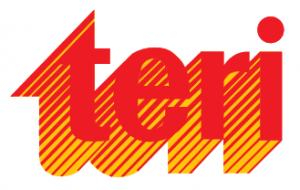TERI
 A unique developing country institution, TERI is deeply committed to every aspect of sustainable development. From advancing solutions to growing urban transport and air pollution problems to promoting energy efficiency in the Indian industry; from tackling global climate change issues across many continents to enhancing forest conservation efforts among local communities; from providing environment-friendly solutions to rural energy problems to helping shape the development of the Indian oil and gas sector, the emphasis has always been on finding innovative solutions to make the world a better place to live in. TERI’s vision for sustainable development is global, and activities undertaken across the entire institute span not only the local and national-level policy and technology space, but are also aimed at suggesting global solutions and sustainable pathways to address critical energy and environment-related issues.
A unique developing country institution, TERI is deeply committed to every aspect of sustainable development. From advancing solutions to growing urban transport and air pollution problems to promoting energy efficiency in the Indian industry; from tackling global climate change issues across many continents to enhancing forest conservation efforts among local communities; from providing environment-friendly solutions to rural energy problems to helping shape the development of the Indian oil and gas sector, the emphasis has always been on finding innovative solutions to make the world a better place to live in. TERI’s vision for sustainable development is global, and activities undertaken across the entire institute span not only the local and national-level policy and technology space, but are also aimed at suggesting global solutions and sustainable pathways to address critical energy and environment-related issues.
TERI’s strength is drawn from its multi-disciplinary work force than spreads across various areas of research undertaken across the institute. While the expertise is spread across various areas including industry, buildings, transport, agriculture, forestry, renewable and conventional energy resources, water, waste, local and global environment, etc. each project draws together a team with the requisite skill sets and experience to include sociologists, economists, engineers, mathematicians, energy system analysts and technical experts as required.
TERI has the distinction of being one of the first developing country institutions to launch research activities in the area of climate change, as early as 1988, and has a dedicated research group on the subject. It undertakes research and outlines policy initiatives to promote effective and equitable solutions to global environmental challenges, suggesting alternative development pathways to reduce the environmental implications of future energy use, and providing solutions that are most desirable from the economic, social and technological perspectives. In the field of global climate change, TERI has been actively engaged in preparing GHG (greenhouse gas) inventories, analysing mitigation options, assessing the impact of climate change, examining national and international policy, and helping build capacity among government, industry, and civil society to address global environmental issues.
TERI also provides technical inputs to the Government of India on issues related to climate change including for the preparation of the National Action Plan on Climate Change. Frequent and directed workshops and seminars are held in order to disseminate information and spread awareness on climate change and other areas related with energy and environment.
TERI’S Modelling and Scenario Analysis activities are aimed at identifying, analysing and prioritising policy options with regard to energy and the environment by quantitative modelling of energy-environment linkages, as well as economic and statistical analysis of energy and related data. TERI’s core modelling team is continuously associated with the development and use of various tools and modelling frameworks for energy and economic forecasting, techno-economic analysis and scenarios of energy and environmental simulation and optimisation. Several projects
have been undertaken to examine energy-environment linkages at the local, regional, and national levels. The team has been involved in leading and being part of several projects related with examining sustainable development strategies and estimating mitigation potentials across various countries using appropriate models and frameworks.
In addition to the stand-alone bottom-up technological energy system model (MARKAL) efforts are also being made in direction to integrate different state of art computational general equilibrium model, climate model, air quality model, impact assessment model together to assess technical and market based policies that maximize synergies and benefits between these policies.
